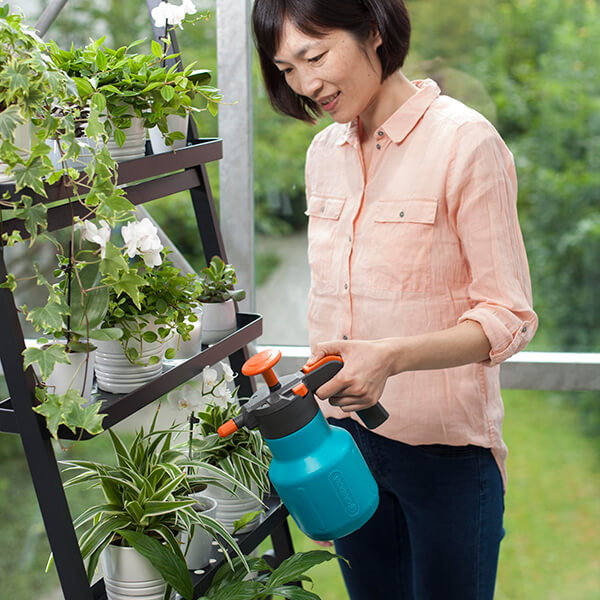"The glory of gardening: hands in the dirt, head in the sun, heart with nature. To nurture a garden is to feed not just on the body, but the soul. "
Courtesy of Alfred Austin
As gardeners we usually associate the benefits of gardening as having our own, homegrown, fruit and vegetables, or a glorious garden packed full of flowers. We might even have thought of gardening as benefitting us physically, as a form of exercise. But in the past few years the benefits of gardening on your mental health and wellbeing has been publicised more and more.
In the UK, around one in four of us (according to Mind) will experience a mental health problem of some kind, such as depression, anxiety, ADHD etc. So anything which we can do to make this better, to reduce our stress and help us to cope more with everyday life is of great interest. So if gardening can help, it’s easy for anyone, even if you only have a windowsill in your flat, a balcony at your apartment, or are lucky enough to have a large garden, to begin gardening.
What The Scientists Say
There has been significant amounts of research carried out across the world which has confirmed that time spent in green spaces and in gardens can be beneficial to our mental health:
Research in Sweden around 2005 concluded that access to a garden, even if it was just a simple balcony, had a significant positive impact on stress.
Using data from over 1,000 participants, a study by the University of Exeter Medical School focused on the mental health benefits of moving to greener urban areas and found that on average movers experienced an immediate improvement in mental health, lasting for at least three years.
“We’ve shown that individuals who move to greener areas have significant and long-lasting improvements in mental health. These findings are important for urban planners thinking about introducing new green spaces to our towns and cities, suggesting they could provide long term and sustained benefits for local communities”.
Reviewing research between 2003 to 2013, an article in the Mental Health Review Journal, concluded that gardening had positive effects, including reducing the symptoms of depression and anxiety, with participants describing a range of benefits including emotional, social, vocational, physical and spiritual.
In 2021 the Mental Health Foundation published a report entitled ‘Nature - How connecting with nature benefits our mental health’. This in-depth report showed that nature and our natural surroundings plays a critical factor in supporting good mental health and preventing distress. This is not just gardening, it includes both our private gardens but also indoor plants and window boxes, as well as larger spaces such as parks, forest and woodlands and even includes so called ‘blue spaces’ like rivers, wetlands, beaches or canals.
Your Body’s Feel-Good Hormones
Based on the conclusions from the scientific research above, we should be spending more time outdoors . . . whether it’s digging at the allotment or simply potting up a hanging basket . . . but what is happening in our bodies to make us respond in this positive way?
Well, to start with, it’s all about serotonin and endorphins.
Serotonin
Dubbed the ‘feel-good hormone’ serotonin plays a key role in helping to reduce or prevent anxiety and depression . . . in fact many of the drugs used to treat anxiety or depression are SSRIs (selective serotonin reuptake inhibitors) which increase the serotonin levels in your brain.
|
Soil and Serotonin Did you know that soil contains the bacteria 'mycobacterium vaccae' which is absorbed through the skin of your palms and fingers when gardening and triggers the release of serotonin in the brain . . .
|
 |
Studies have found that this bacteria has a similar affect on the brain as some medication, but without side effects. It has been shown to increase cognitive ability, lower stress and increase concentration and that these positive effects gained from working with soil can be felt for up to three weeks.
|
|
“Mud is squidgy, slippery, sludgey. Mud you can roll flat, mud you can press. Courtesy of Janet Paisley
|
Endorphins
Endorphins are chemical signals in the brain which block the perception of pain, reduce stress and increase the feelings of wellbeing. You can increase the endorphins in your body in many ways, including exercise and as gardening involves gentle exercise, by gardening your endorphins should increase and your mood accordingly.
A Regular Dose Of Gardening
Did you know that therapeutic gardens have been used in hospitals for thousands of years . . . in fact Florence Nightingale was a strong advocate for gardens being used in hospitals
“I shall never forget the rapture of fever patients over a bunch of bright-coloured flowers” . . . “people say the effect is only on the mind. It is no such thing. The effect is on the body too”
You’ll now find many new hospitals being designed to feature gardens, with a study in 1984 by environmental psychologist Roger Ulrich demonstrating that looking at a garden can sometimes speed the healing process after surgery, from infections or other ailments. Working with colleagues in Sweden, in 1993 Ulrich carried out further studies that indicated that patients simply exposed to large photographs of an open, tree-lined stream were less anxious and needed less pain medication than those who were given views of a shadowy forest, abstract art or no pictures at all.
There have been many studies carried out throughout both the UK and across the world that all appear to show the positive effects of ‘green care’, whether it involves just pictures of nature, looking at actual gardens, visiting gardens or gardening.


